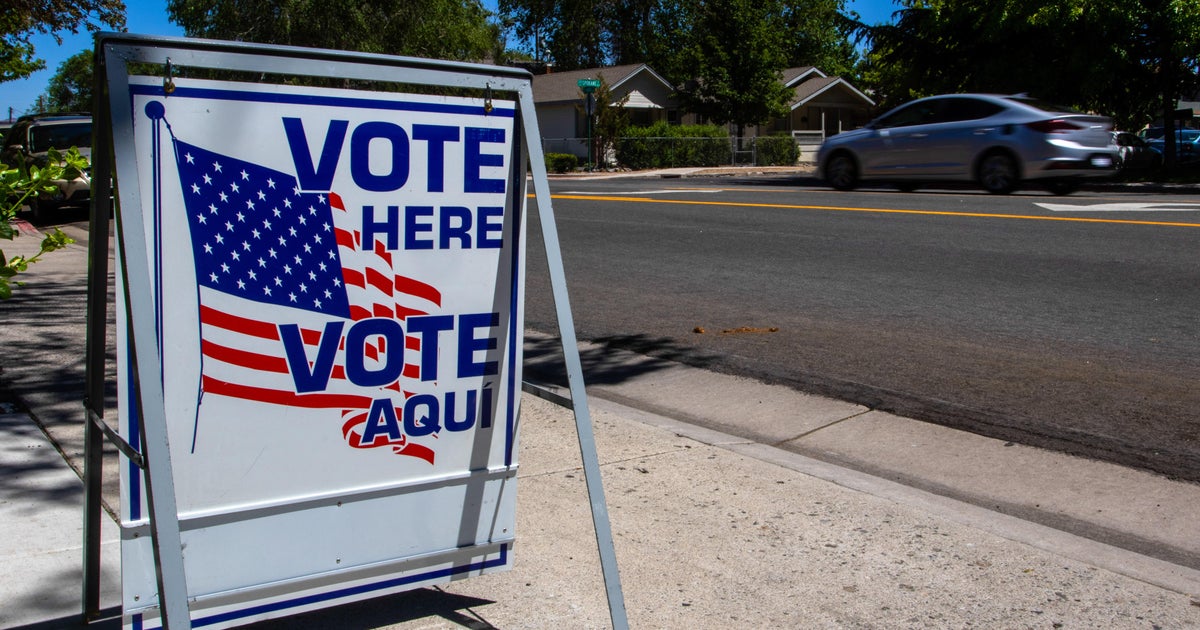
Washington — Nevada is set to host its first-in-the-West presidential nominating contest on Tuesday. But the 2024 process features new twists with two GOP events this week — a primary and caucuses — creating an unusual scenario where the leading Republican White House hopefuls won’t directly face off in the Silver State.
While the state is set to host Democratic and Republican primaries on Tuesday, the GOP opted to hold on to the traditional caucuses, with Republican caucuses set for Thursday in addition to Tuesday’s state-run primary.
The result is a confusing process that some expect to hinder turnout, and likely lead to both former U.N. Ambassador Nikki Haley and former President Donald Trump declaring victory in the state — though only one will walk away with its delegates.
Why is Nevada having a Republican caucus and primary?
A change to state law in 2021 by the majority-Democratic legislature, after years of dwindling attendance at caucuses, transitioned the state from party-run caucuses to government-run primaries going forward. The change came amid a series of new voting initiatives geared toward improving voter access, like expanding voting by mail, at a time when other states were placing more restrictions on voting to counteract allegations of voter fraud.
In a protest to the move, the Nevada Republican Party, which has argued that the caucuses are more secure and encourage candidates to connect with voters, are holding the caucuses anyway. Nevada Republicans have made clear that the caucuses are the only method to earn the party’s delegates in the state, while effectively barring anyone on the primary ballot from appearing on the caucus ballot.
“Simply put, candidates who participate in an illegitimate process cannot expect to earn legitimate delegates to the Republican National Convention,” the Nevada GOP said in a statement.
As of Monday morning over 59,000 Republican ballots have already been cast for the primary (a majority of these are from returned mail ballots), according to Nevada’s Secretary of State office. Meanwhile, over 95,000 Democratic ballots have been cast — over 81,000 of these are from returned mail ballots.
Who is on the ballot in the Nevada primaries?
President Biden faces author Marianne Williamson on the ballot, along with a list of lesser-known candidates. Rep. Dean Phillips of Minnesota will not be on the Democratic ballot in Nevada, having entered the race after the filing deadline passed. Thirty-six Democratic delegates are up for grabs — though any challenger to Biden would have to meet the threshold of 15% statewide, or in a Congressional district, to qualify for any delegates.
On the Republican ballot will be Haley, whose name will be joined by former White House hopefuls Sen. Tim Scott of Florida and former Vice President Mike Pence – both of whom have suspended their campaigns. Trump, along with the others who had been seeking the GOP nomination, like Gov. Ron DeSantis, also won’t appear on the primary ballot, having opted to participate in the caucuses instead. Voters also have the option to select “none of these candidates,” though write-in votes are not permitted.
Why isn’t Trump on the ballot for the Nevada republican primary?
Trump chose not to appear on the primary ballot, opting instead to appear on the GOP caucus ballot, alongside long-shot White House hopeful Ryan Binkley. Trump’s opponents have claimed that the effort to keep the caucuses going in the state was pushed by the former president’s allies. The state Republican party also established rules against any meaningful involvement (such as the distribution of literature) by super PACs at the caucus, which irked some campaigns, such as DeSantis’, which leaned heavily on organizing efforts from outside groups.
Trump nodded to Haley’s choice to appear on the primary ballot, rather than in the caucuses, in remarks after his victory in New Hampshire, saying she’d “decided not to play in Nevada.”
“I did hear Nikki say ‘it’s off to South Carolina,’ and I do love South Carolina, but she forgot one thing: next week it’s Nevada,” Trump said in his New Hampshire victory speech in January. “And I’m pleased to announce we just won Nevada, 100%.”
What time do polls close for the Nevada primary and caucus?
Polls close at 7 p.m. local time on Tuesday in the Nevada primaries. Republican voters can participate in both the GOP primary and caucuses.
On Thursday, the GOP caucus hours are 5 p.m. to 7:30 p.m. local time.
What does the winner of the Nevada GOP primary get?
Haley, if she wins the primary, will not be awarded any delegates, which are tied to the caucuses. She likely will tout the showing on Tuesday as a success, hoping to garner new momentum heading into South Carolina’s primary contest later this month.
What is the current Republican delegate count?
Trump picked up 20 delegates in Iowa and 13 in New Hampshire, while Haley picked up eight in Iowa and nine in New Hampshire. A candidate needs 1,215 delegates to capture the GOP nomination.
